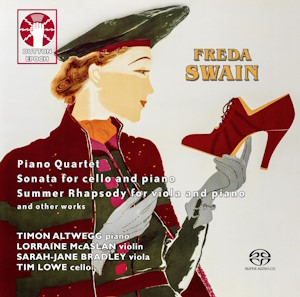
Freda Swain (1902-1985)
Summer Rhapsody (1936)
English Reel (1958)
Song at Evening (1958)
Cello Sonata in C minor (1923)
Piano Quartet in G minor (1950)
Lorraine McAslan (violin), Sarah-Jane Bradley (viola), Tim Lowe (cello), Timon Altwegg (piano)
rec. 2022/23, St George’s Headstone, Harrow, UK
Dutton CDLX7412 SACD [75]
It was two years ago that I reviewed my first all-Freda Swain disc, the only one that I’d yet encountered (review) given that her name is more honoured in the breach. There seems to have been a more focused attempt to get to grips with her legacy of late and it’s good to see that Dutton has joined Toccata in promoting her music. The chamber works in this disc trace her from the Cello Sonata of 1923, composed when she was 21, to the Piano Quartet of 1950, though there are a couple of slim, character pieces from 1958 to consider.
The Cello Sonata dates from the same compositional year as a much better-known example, that of John Ireland, though Ireland’s Sonata wasn’t premiered until 1924. Swain was a pianist and her studies at Tobias Matthay’s school and at the Royal College of Music equipped her soundly – she studied composition under Stanford – and this is a thoroughly sound work. It offers a sturdy chassis with clean-cut themes that offer expressive breadth. In the slow section there is due melancholy but one subjected to increasing urgency, somewhat unremitting in effect. In his notes, pianist Timon Altwegg, who has inherited a number of Swain’s manuscripts and was the motor for that Toccata disc already cited, admits that the Sonata has certain formal weaknesses. One of these is her tendency to linger over material and you can hear this in the second half of the work where it tends to devitalise momentum, but in her defence, I’d add that this (admitted) weakness is to a small degree offset by the youthful ardour of her themes. It is, after all, a very early work and if it lacks a strong sense of definition and personality it does reveal something about her organisational abilities and, indeed, sometimes her lack of them. No complaints about the fine playing, however, of Tim Lowe and Timon Altwegg.
The Piano Quartet in G minor is a three-movement work lasting 32 minutes in this performance by the formidable team of Lorraine McAslan, Sarah-Jane Bradley, Lowe and Altwegg. Altwegg cites it in the lineage of the Piano Quartets by Cyril Scott, William Hurlstone, Frank Bridge and Herbert Howells. Despite its three-movement form it sounds to me very much like a Cobbett-era work, full of vitality and energy, with fine distribution of material – though that for the piano can be rather clotted. The themes are essentially lyrical and the music mines a folkloric theme from time to time. The slow movement is expressively direct, a little surprisingly for Swain, who was prone to moments of opaqueness, though there is more equivocal writing later. There’s an especially nice opportunity for McAslan to spin a seductive line over the accompanying piano. Altwegg points to a theme reminiscent of an African-American spiritual, though I have to say I can’t hear it. The finale is boldly projected, compact and resilient. Textures are lighter, here, and there’s a rather quasi-Iberian piano to enjoy. This is music of clean-cut ebullience.
In 1936 she wrote Summer Rhapsody for viola and piano, part of a cycle called Three Sonnets by Shakespeare for voice and piano of which the Summer Rhapsody is the non-vocal prelude. It was played in concert by William Primrose and the composer in a Swain-Ireland-Dvořák concert during which her String Quartet No.1 was also performed. This is the work here that most ties her to the English Pastoral School. It’s most redolent of Vaughan Williams – The Lark Ascending, most obviously – but there are also a few Baxian shadows. The modality is certainly striking. At 13-minutes it’s rather too long for its material but understandable when one realises that she intended a version – which she never completed – for viola and orchestra. English Reel and Song at Evening were graded educational pieces – Grade V11 and Grade VI respectively – dating from 1958. The Reel is a touch acerbic and asks quite a lot of both performers and the latter encourages a richly sustained legato.
All the performances are fully committed and instrumentally and collectively first-class and have been recorded in Dutton’s favoured location. This is an SACD though I listened conventionally.
Jonathan Woolf
Buying this recording via the link below generates revenue for MWI and helps us keep free access to the site

Also available: Dutton Vocalion


















